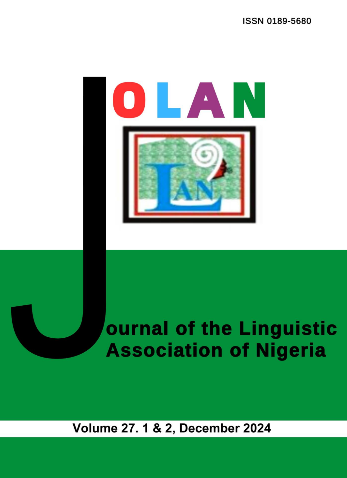The role of teachers in national language policy implementation in Nigeria through digital technology and social media
DOI:
https://doi.org/10.60787/jolan.vol5no1.408Keywords:
National language policy (Nigeria), bilingual education, digital literacy, educational technology, social media in language learningAbstract
This study examines the role of teachers in implementing Nigeria's national language policy, focusing on the use of digital technology and social media as innovative tools for overcoming longstanding challenges. It highlights how teachers can leverage these platforms to enhance language instruction, expand access to resources, and foster community engagement. By integrating digital literacy into language education, teachers can address barriers such as inadequate training, limited materials, and overcrowded classrooms. The findings indicate that digital tools offer scalable, cost-effective solutions for policy implementation, particularly in bilingual education. Online platforms, social media networks, and digital content creation empower teachers to deliver more inclusive and culturally relevant instruction. While challenges such as limited digital literacy and weak infrastructure persist, targeted professional development and sustained investment in digital resources can significantly improve outcomes. Embedding digital strategies within the national language policy not only strengthens educational quality but also promotes cultural preservation and national unity.
References
Abdullahi, M. A. (2023). Public-private partnerships in digital education in Abuja. Nigerian Journal of Education and Technology, 15(2), 55-67.
Adewale, O. S. (2020). Evaluating the impact of digital resources in rural Nigerian schools. Journal of Educational Development, 11(3), 89-102.
Adegbija, E. (2004). Language policy and planning in Nigeria. Current Issues in Language Planning, 5(3), 181-246.
Akinola, R. T. (2021). The impact of the Lagos Digital School Initiative on language learning outcomes. Education and Development Review, 8(4), 110-123.
Albirini, A. (2006). Teachers’ attitudes toward information and communication technologies: The case of Syrian EFL teachers. *Computers & Education*, 47(4), 373-398.
Bamgbose, A. (1991). Language and the nation: The language question in sub-Saharan Africa. Edinburgh University Press.
Collins, A., & Halverson, R. (2018). Rethinking education in the age of technology: The digital revolution and schooling in America. Teachers College Press.
Eze, I. A. (2022). Digital challenges and solutions in rural Benue State education. African Journal of Digital Education, 9(1), 78-92.
Fafunwa, A. B. (1989). Education in Nigeria: Historical and contemporary perspectives. Allen & Unwin.
Gulati, S. (2008). Technology-enhanced learning in developing nations: A review. The International Review of Research in Open and Distributed Learning, 9(1), 1-16.
Igboanusi, H. (2008). The future of indigenous languages in Nigeria: The case of minority languages. International Journal of the Sociology of Language, 200(2), 121-138.
Federal Republic of Nigeria. (2013). National Policy on Education (6th ed.). Nigerian Educational Research and Development Council (NERDC).
Downloads
Published
How to Cite
Issue
Section
License
Copyright (c) 2025 Journal of The Linguistic Association of Nigeria

This work is licensed under a Creative Commons Attribution-NonCommercial-ShareAlike 4.0 International License.














